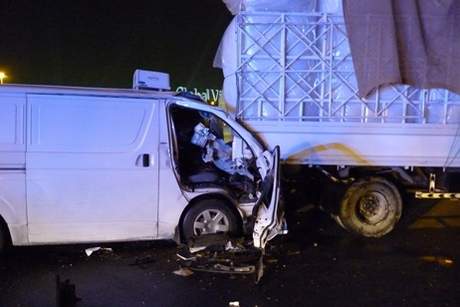In accordance with a study released from Dubai Police, traffic accidents including more than one car caused deaths over the past 11 months.
The study unveils horrific numbers of 95 deaths and 1,710 injuries from 2,124 vehicle smashes; whereas the second highest number of deaths were pedestrians being hit by vehicles, with 40 killed and 361 injuries in the same period.
Major General Mohammed al-Zafeen, the Director of Dubai Traffic, pointed out that most pedestrian deaths were people trying to cross roads in unauthorized routes.
According to the Emirati Al Ittihad paper, Mr al-Zafeen said this could be caused by “cultural differences in road safety practices among the emirate’s population.”
Seven people also died in 59 accidents when drivers crashed into metal barriers, seven were killed after crashing into street signs and four died crashing into pavements.
In addition, Dubai Police said over the past 11 months, more than 13,000 motorists were caught jumping red lights, causing 158 crashes with six people killed and 238 injured.
These facts and numbers show a 10 per cent drop in accidents from 2012.
In the end, Mr al-Zafeen added, road users who do not abide by traffic signals face a AED800 fine and their vehicle will be confiscated for 15 days and they will also receive eight black points on their license.
About Dubai:
Dubai (/duːˈbaɪ/ doo-BY; Arabic: دبيّ Dubayy, IPA: [dʊˈbæj]) is an emirate in the United Arab Emirates (UAE) federation. The main city of the emirate is also called Dubai. The emirate is located on the southeast coast of the Persian Gulf and is one of the seven emirates that make up the country. It has the largest population in the UAE (2,106,177) and the second-largest land territory (4,114 km2) after the capital, Abu Dhabi. Abu Dhabi and Dubai are the only two emirates to have veto power over critical matters of national importance in the country’s legislature. The city of Dubai is located on the emirate’s northern coastline and heads up the Dubai-Sharjah-Ajman metropolitan area
The earliest mention of Dubai is in 1095 AD, and the earliest recorded settlement in the region dates from 1799. Dubai was formally established on the 9th June 1833 by Sheikh Maktoum bin Butti Al-Maktoum when he persuaded around 800 members of his tribe of the Bani Yas, living in what was then the Second Saudi State to follow him to the Dubai Creek by the Abu Falasa clan of the Bani Yas. It remained under the tribe’s control when the United Kingdom agreed to protect the Sheikhdom in 1892 and joined the nascent United Arab Emirates upon independence in 1971 as the country’s second emirate. Its strategic geographic location made the town an important trading hub and by the beginning of the 20th century, Dubai was already an important regional port.
Today, Dubai has emerged as a cosmopolitan metropolis that has grown steadily to become a global city and a business and cultural hub of the Middle East and the Persian Gulf region. It is also a major transport hub for passengers and cargo. Although Dubai’s economy was historically built on the oil industry, the emirate’s Western-style model of business drives its economy with the main revenues now coming from tourism, aviation, real estate, and financial services. Dubai has recently attracted world attention through many innovative large construction projects and sports events. The city has become symbolic for its skyscrapers and high-rise buildings, such as the world’s tallest Burj Khalifa, in addition to ambitious development projects including man-made islands, hotels, and some of the largest shopping malls in the region and the world. This increased attention has also highlighted labor and human rights issues concerning the city’s largely South Asian workforce. Dubai’s property market experienced a major deterioration in 2008–2009 following the financial crisis of 2007-2008, but is making a gradual recovery with help coming from neighboring emirates.
As of 2012, Dubai is the 22nd most expensive city in the world, and the most expensive city in the Middle East. Dubai has also been rated as one of the best places to live in the Middle East, including by American global consulting firm Mercer who rated the city as the best place to live in the Middle East in 2011.
For more information about Selling Damaged Cars, please visit: http://uae.sellanycar.com/Selling-Damaged-Cars.html



